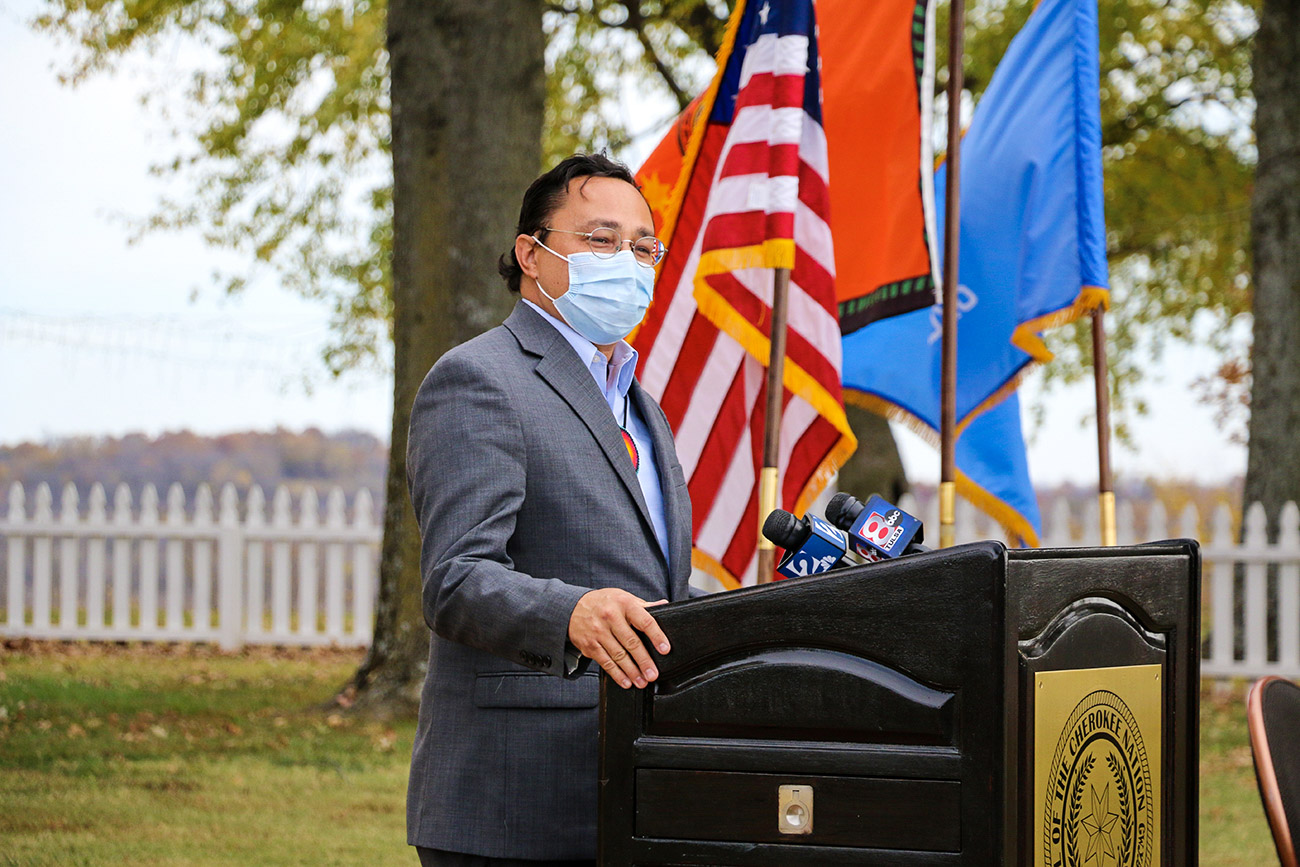Indianz.Com > News > Chuck Hoskin: Protecting tribal sovereignty in Oklahoma
Chief Hoskin discusses ongoing efforts to protect sovereignty under McGirt caseAt Cherokee Nation, work continues to protect Cherokee sovereignty, our reservation and victory in the landmark U.S. Supreme Court McGirt decision. Cherokee Nation Principal Chief Chuck Hoskin Jr. gives an important update on our efforts protecting sovereignty under the McGirt case:
Posted by Cherokee Nation on Friday, November 6, 2020
Cherokee Nation ready to tackle new challenges in post SCOTUS decision landscape
Monday, November 16, 2020
Cherokee Nation
I live on reservation land, where I am governed by the Cherokee Nation and federal laws. I also live in the state of Oklahoma, where I am proud of our tribe’s successful partnership with the state government over decades.
Unfortunately, Gov. Kevin Stitt seems to believe those two facts are mutually exclusive.
Following the U.S. Supreme Court decision in McGirt v. Oklahoma, tribes celebrated the long overdue recognition that our land remains our land and that Congress never disestablished our reservations. As Principal Chief of the Cherokee Nation, I celebrate the ruling while also recognizing that it creates challenges. The ruling concludes that Oklahoma has been prosecuting criminal cases that do not fall under its jurisdiction for years. Now that this error has been corrected, tribes are working swiftly to expand our capacity to ensure justice continues smoothly for our citizens and all Oklahomans.
Indian Country has met greater challenges in the past. I am confident that we can work with state and federal governments to resolve this challenge without infringing on our sovereignty.

In a letter to Oklahoma’s Congressional delegation, I encouraged consideration of Attorney General Hunter’s plan and warned of the dangers of Gov. Stitt’s approach. I know our delegation appreciates the role of tribes in Oklahoma, and I hope they agree that any proposal which tries to erase the role of tribes is unacceptable. The Cherokee Nation and Oklahoma are not at odds. We have the same goals of safety and justice for all Cherokees and all Oklahomans. Stitt must commit to working with tribes rather than trying to exclude us from the process..@CherokeeNation Principal Chief Hoskin says he would fight disestablishment to protect sovereignty. “[Gov. Stitt] had an opportunity… to say no… reservation is going to be disestablished. He didn’t do it, that’s alarming.” #Sovereignty #CherokeeStrong #McGirt https://t.co/OBlfxaNiR1
— Chief Chuck Hoskin, Jr. (@ChuckHoskin_Jr) October 23, 2020
Chuck Hoskin Jr. is the 18th elected Principal Chief of the Cherokee Nation, the largest Indian tribe in the United States. He is only the second elected Principal Chief of the Cherokee Nation from Vinita, the first being Thomas Buffington, who served from 1899-1903. Prior to being elected Principal Chief, Hoskin served as the tribe’s Secretary of State. He also formerly served as a member of the Council of the Cherokee Nation, representing District 11 for six years.
Search
Filed Under
Tags
More Headlines
Native America Calling: Traditional love stories
Native America Calling: Honoring artists who demonstrate community spirit
‘We stand firm. We hold our ground’: Federal freeze impacts tribal gathering in nation’s capital
AUDIO: The 2025 State of Indian Nations in Washington, D.C.
RECAP: National Congress of American Indians hosts State of Indian Nations
Chuck Hoskin: Cherokee Nation supports our artists
Native America Calling: The State of Indian Nations in 2025
Ernie Stevens: Protecting tribal sovereignty in a new political era
Rhonda LeValdo and Gaylene Crouser: Not In Our Honor
AUDIO: Legislative Hearing on H.R.410, H.R.412, H.R.504 & H.R. 741
Native America Calling: Native in the Spotlight with Tatanka Means
VIDEO: ‘Thank you for your leadership’: Sen. Lisa Murkowski (R-Alaska) to Sen. Brian Schatz (D-Hawaii)
VIDEO: Senate Committee on Indian Affairs Organizational Business Meeting
Alaska Beacon: Trump administration faces lawsuit over tribal gaming facility
Native America Calling: Medicaid’s next chapter in Indian Country
More Headlines
Native America Calling: Honoring artists who demonstrate community spirit
‘We stand firm. We hold our ground’: Federal freeze impacts tribal gathering in nation’s capital
AUDIO: The 2025 State of Indian Nations in Washington, D.C.
RECAP: National Congress of American Indians hosts State of Indian Nations
Chuck Hoskin: Cherokee Nation supports our artists
Native America Calling: The State of Indian Nations in 2025
Ernie Stevens: Protecting tribal sovereignty in a new political era
Rhonda LeValdo and Gaylene Crouser: Not In Our Honor
AUDIO: Legislative Hearing on H.R.410, H.R.412, H.R.504 & H.R. 741
Native America Calling: Native in the Spotlight with Tatanka Means
VIDEO: ‘Thank you for your leadership’: Sen. Lisa Murkowski (R-Alaska) to Sen. Brian Schatz (D-Hawaii)
VIDEO: Senate Committee on Indian Affairs Organizational Business Meeting
Alaska Beacon: Trump administration faces lawsuit over tribal gaming facility
Native America Calling: Medicaid’s next chapter in Indian Country
More Headlines